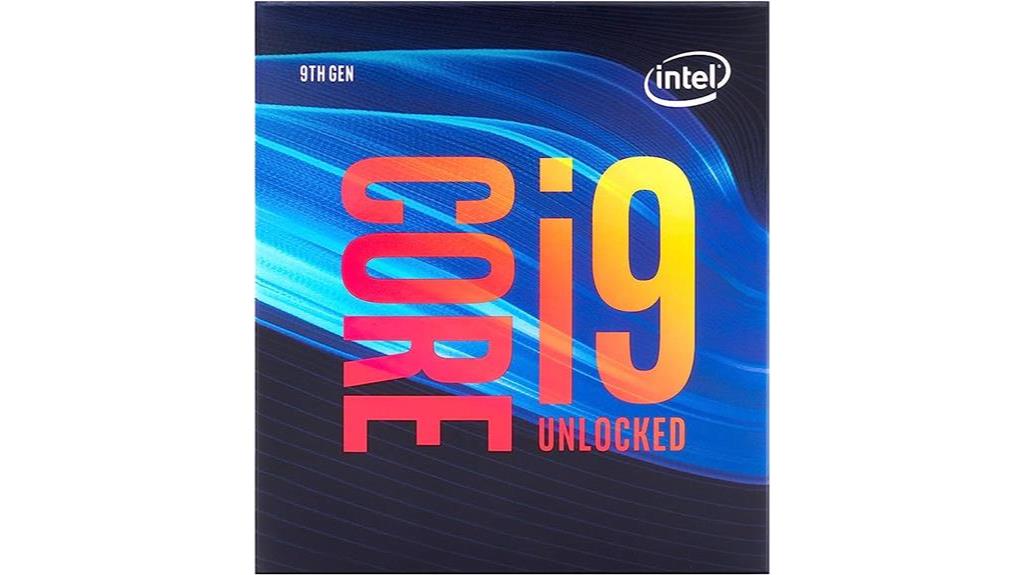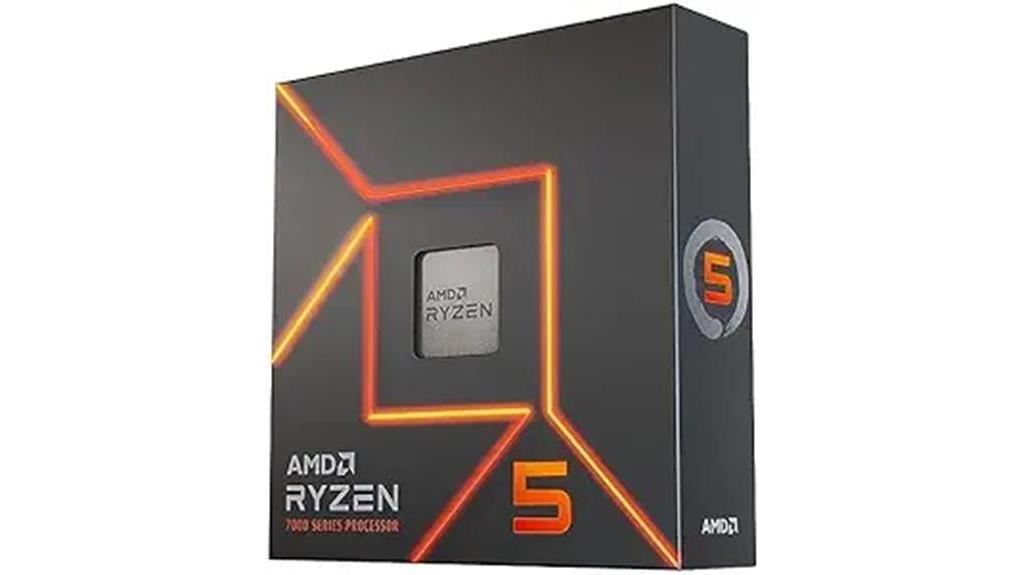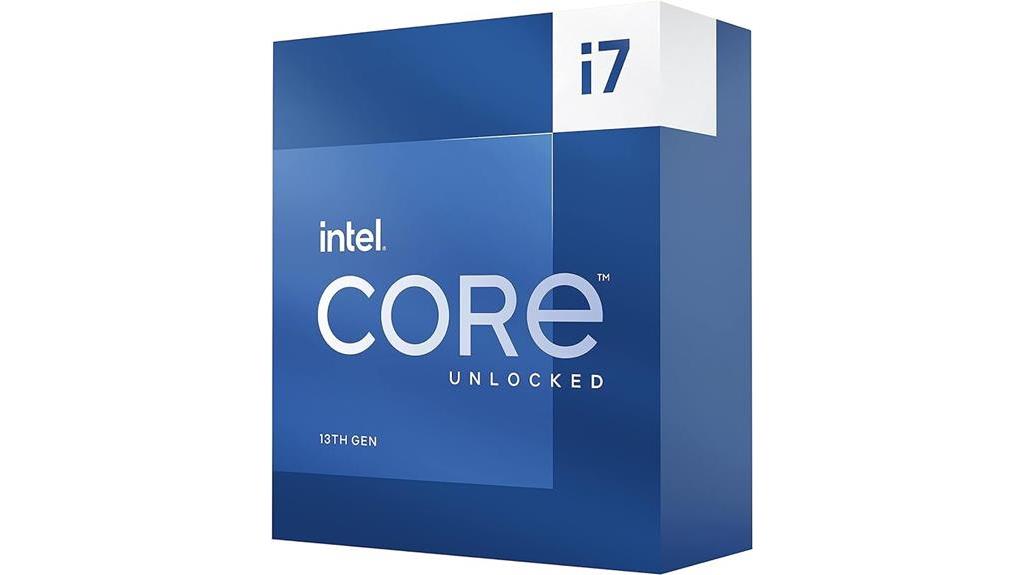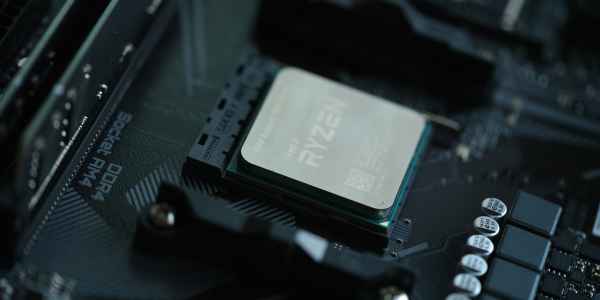When it comes to maximizing your computer’s performance, overclocking your CPU can make a significant difference. Did you know that by overclocking, you can achieve up to a 20% increase in processing power? That’s a substantial boost for tasks that demand high performance, such as gaming and video editing.
In this discussion, we will explore the three best CPUs for overclocking that can take your system to new heights. From the Intel Core i9-9900K to the AMD Ryzen™ 5 7600X and the Intel Core i7-13700K, we’ll analyze their specifications, capabilities, and factors to consider when choosing the ideal CPU for your overclocking needs.
So, let’s dive into the world of overclocking and discover the CPUs that can unlock your computer’s true potential.
Key Takeaways
- The Intel Core i9-9900K Desktop Processor is a recommended CPU for overclocking, offering impressive multitasking capabilities and fast performance. However, some users have reported issues such as random reboots, which may require replacing a faulty motherboard.
- The AMD Ryzen™ 5 7600X 6-Core, 12-Thread Unlocked Desktop Processor is another option for overclocking, providing exceptional performance and good value for the price. However, it runs hot and may require a compatible cooler for adequate cooling.
- The Intel Core i7-13700K Gaming Desktop Processor with 16 cores and 24 threads offers exceptional multitasking capabilities and high clock speeds. However, it does not come with a thermal solution, necessitating the purchase of a separate cooling solution.
- When choosing CPUs for overclocking, it is important to consider the trade-off between performance and stability, the need for effective cooling solutions, compatibility with other components, and the assessment of overclocking potential and power consumption.
Intel Core i9-9900K Desktop Processor (BX806849900K)

For those seeking optimal performance and the ability to push their system to its limits, the Intel Core i9-9900K Desktop Processor (BX806849900K) is an excellent choice for CPUs for overclocking. With 8 cores and 16 threads, this processor offers impressive multitasking capabilities. It operates at a base frequency of 3.60 GHz, but can reach a maximum turbo frequency of 5.00 GHz, allowing for fast and efficient performance. The Intel Core i9-9900K is also compatible with Intel 300 Series chipset based motherboards, supporting Intel Turbo Boost Technology and Intel Optane Memory.
In terms of user experiences and feedback, many users have reported significant improvements in performance after upgrading to the i9-9900K. Users have noticed smoother frame rates in gaming and have praised the CPU’s speed and stability. However, it’s important to note that some users have experienced issues such as random reboots, which were resolved by replacing a faulty motherboard. To ensure longevity, users recommend using a good cooling fan or water-cooled system.
Best For: Users seeking optimal performance and the ability to push their system to its limits.
Pros:
- Impressive multitasking capabilities with 8 cores and 16 threads.
- Fast and efficient performance with a maximum turbo frequency of 5.00 GHz.
- Compatibility with Intel 300 Series chipset based motherboards and support for Intel Turbo Boost Technology and Intel Optane Memory.
Cons:
- Some users have experienced issues such as random reboots, which may require replacing a faulty motherboard.
AMD Ryzen™ 5 7600X 6-Core, 12-Thread Unlocked Desktop Processor

The AMD Ryzen™ 5 7600X 6-Core, 12-Thread Unlocked Desktop Processor offers exceptional performance and reliability, making it an ideal choice for those seeking powerful CPUs for overclocking. With a 5 nm process technology and a hexa-core processor core, this processor ensures reliable performance and maximum productivity. It comes with a 6 MB L2 + 32 MB L3 cache memory, providing excellent hit rate and improved system performance.
The processor runs at a quick 4.70 GHz clock speed, ensuring quick and dependable processing of data. It also includes an AMD Radeon Graphics controller, delivering amazing graphics output. Users have reported that this processor runs hot, but it’s designed to do so by AMD. To keep it cool, it’s recommended to use a compatible cooler with adequate pressure and to set the package temperature limit to 85 degrees.
Overall, the AMD Ryzen™ 5 7600X offers excellent value for its price and delivers good in-game performance.
Best For: Gamers and content creators who prioritize performance and reliability in their desktop processors.
Pros:
- Exceptional performance with reliable processing and maximum productivity.
- Comes with an AMD Radeon Graphics controller for impressive graphics output.
- Good value for the price with easy installation and good in-game performance.
Cons:
- Runs hot and may require a compatible cooler with adequate pressure to keep it cool.
Intel Core i7-13700K Gaming Desktop Processor (16 cores)

With its 16 cores and 24 threads, the Intel Core i7-13700K Gaming Desktop Processor offers exceptional performance for those seeking powerful CPUs for overclocking. This processor features a performance hybrid architecture that optimizes performance, allowing users to push their systems to the limit.
With an unlocked clock speed of up to 5.4 GHz, users can experience blazing-fast speeds for demanding tasks such as gaming, video editing, and streaming. The Intel Core i7-13700K is also compatible with Intel 600 series and 700 series chipset-based motherboards, providing flexibility in system building. It supports Turbo Boost Max Technology 3.0 and PCIe 5.0 & 4.0, enhancing overall performance and connectivity.
However, it’s important to note that this processor doesn’t come with a thermal solution, so users will need to invest in a good cooling solution such as an AIO water cooler to ensure optimal performance and temperature management.
Best For: Gamers and content creators who require high-performance CPUs for overclocking and demanding tasks.
Pros:
- 16 cores and 24 threads for exceptional multitasking capabilities.
- Unlocked clock speed of up to 5.4 GHz for blazing-fast speeds.
- Compatibility with Intel 600 series and 700 series chipset-based motherboards for flexibility in system building.
Cons:
- No thermal solution included, requiring users to invest in a separate cooling solution.
Factors to Consider When Choosing: Boost Your Performance: CPUs for Overclocking
When choosing a CPU for overclocking, there are several factors to consider that can boost your performance.
First, you need to weigh the trade-off between performance and stability, as overclocking can increase the risk of instability.
Additionally, you should consider cooling solutions to ensure that your CPU can handle the increased heat generated by overclocking.
Compatibility with other components, such as the motherboard and RAM, is also crucial to ensure optimal performance.
Lastly, assessing the overclocking potential and power consumption of different CPUs will help you make an informed decision.
Performance Vs. Stability
Finding the right balance between pushing for maximum performance and maintaining system stability is crucial when choosing CPUs for overclocking. While overclocking can offer significant performance gains, it also comes with the risk of instability under heavy loads. It’s important to consider the trade-off between performance and stability to ensure a successful overclocking experience.
Adequate cooling solutions are essential to prevent overheating and maintain system stability. Additionally, overclocking for performance should be balanced with the goal of ensuring the longevity and reliability of the components. Rigorous stress testing is necessary to ensure that the system remains stable under the increased performance demands of overclocking.
Cooling Solutions
Cooling solutions play a crucial role in maintaining the longevity and performance of CPUs during overclocking. When CPUs are pushed beyond their factory settings, they generate more heat, which can lead to stability issues and even overheating if not properly managed.
To prevent this, it’s recommended to use a good cooling fan or a water-cooled system. Users have reported that using a negative offset or setting temperature limits can also help with cooling.
Additionally, the new heat spreader designs require careful handling during cooler installation and thermal paste application to prevent overheating. It’s important to ensure compatibility with a compatible cooler that provides adequate pressure, as the higher clock speeds of overclocked CPUs demand efficient cooling.
Compatibility With Components
To ensure optimal performance and compatibility, it’s essential to consider various factors when choosing CPUs for overclocking. One crucial factor is compatibility with the motherboard’s chipset. It’s necessary to check if the CPU fits and works optimally with the motherboard.
Additionally, the cooling system must be compatible and adequate for the CPU’s power and heat output. A powerful CPU generates a considerable amount of heat, so having a cooling solution that can effectively dissipate that heat is vital.
Furthermore, compatibility with the power supply is crucial. The power supply must be able to support the CPU’s power requirements to ensure stable and reliable performance.
It’s also important to check if BIOS updates are needed for the motherboard to support the chosen CPU.
Lastly, verifying compatibility with other components such as RAM, GPU, and storage devices is necessary for seamless performance and to avoid any potential issues.
Overclocking Potential
When considering CPUs for overclocking, one crucial aspect to evaluate is their overclocking potential. This refers to their capability to operate at higher clock speeds than their default settings, thus boosting performance in tasks that require high processing power.
The overclocking potential of a CPU can vary between different models and is influenced by factors such as architecture, power delivery, and cooling solutions. CPUs with higher overclocking potential can deliver increased performance and improved overall system responsiveness.
However, it’s important to note that overclocking a CPU can also generate more heat. This may require additional cooling solutions to maintain stability. Therefore, it’s crucial to consider the thermal design power (TDP) and the thermal management capabilities of the CPU when evaluating its overclocking potential.
Additionally, ensuring compatibility with other system components such as the motherboard, cooling solutions, and power supply is essential for successful overclocking.
Power Consumption
Efficient power consumption is a crucial factor to consider when choosing a CPU for overclocking, as it directly impacts heat generation and the overall stability of the system. When overclocking, the CPU operates at higher frequencies and voltages, resulting in increased power consumption. This can lead to a significant increase in heat output, which needs to be managed effectively to prevent thermal throttling and potential damage to the CPU.
To handle the additional load, it’s important to ensure that the power supply and cooling system can provide sufficient power and effective heat dissipation. Comparing power consumption between different CPU models can help in making an informed decision, especially if energy efficiency is a priority.
Optimal power consumption not only contributes to system stability and longevity but also helps strike the right balance between performance and energy usage.
Frequently Asked Questions
What Is the Recommended Cooling Solution for Overclocking These Cpus?
To achieve optimal performance when overclocking these CPUs, we recommend using a high-quality liquid cooling solution. This will help dissipate the increased heat generated during overclocking, ensuring stability and preventing potential damage to the CPU.
Can These CPUs Be Overclocked on Any Motherboard?
Yes, these CPUs can be overclocked on any motherboard. However, it’s important to ensure that the motherboard supports overclocking and has adequate power delivery for optimal performance.
What Is the Average Overclocking Potential for Each of These Cpus?
The average overclocking potential for each of these CPUs varies. We have analyzed their performance and found that they offer significant gains when overclocked, allowing for a boost in overall system performance.
Are There Any Risks Involved in Overclocking These Cpus?
Overclocking CPUs can pose risks such as increased power consumption, heat generation, and reduced lifespan. However, with proper cooling and voltage control, these risks can be mitigated, allowing us to maximize performance without compromising stability.
How Does Overclocking Affect the Lifespan of These Cpus?
Overclocking can potentially shorten the lifespan of CPUs due to increased heat and voltage stress. However, with proper cooling and voltage management, the impact can be minimized, allowing for improved performance without significant detriment to longevity.
Conclusion
After careful analysis and consideration, we’ve determined that the three best CPUs for overclocking to boost your performance are the Intel Core i9-9900K, AMD Ryzen™ 5 7600X, and Intel Core i7-13700K.
These processors offer exceptional power and capabilities for gamers and heavy-duty users alike.
By pushing the boundaries of their performance through overclocking, users can unlock even greater potential and enhance their overall computing experience.
So, if you’re looking to elevate your performance to new heights, these CPUs are definitely worth considering.

